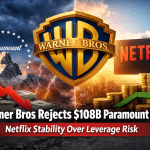Rupert Murdoch and his son Lachlan could soon wield influence over one of America’s most popular social media apps, as Donald Trump claims the powerful media family is likely to be part of a blockbuster deal to take control of TikTok’s U.S. operations.
An emerging transaction to transfer TikTok’s U.S. operations to American owners may include Rupert Murdoch and his son Lachlan Murdoch among other high-profile business figures, according to President Donald Trump. The deal is part of a broader national security and political push to reduce foreign influence over the popular social media app.
What Trump Has Said Is Happening
In a Fox News interview aired Sunday, Trump claimed that Rupert Murdoch, Lachlan Murdoch, Oracle’s Larry Ellison, and Dell founder Michael Dell are likely to be part of a U.S. investor consortium taking over ByteDance’s TikTok U.S. arm. He described these individuals as “very prominent people” and “American patriots” who would do a “really good job.” This comes amid laws requiring ByteDance to sell TikTok’s U.S. operations or face a ban according to ABC News.
White House Press Secretary Karoline Leavitt has clarified some roles: Oracle is to be responsible for data and security, and Americans would occupy six of seven board seats in the reorganised U.S. version of TikTok. The U.S. would also control the app’s algorithm under this framework.

The TikTok logo shown on a mobile phone screen, symbolizing the app’s global influence.
Legal & Legislative Backdrop
In April 2024, Congress passed the Protecting Americans from Foreign Adversary Controlled Applications Act (PAFACA), which requires that social media services owned or controlled by foreign adversaries must divest their U.S. operations or face a ban. ByteDance, the Chinese parent of TikTok, is subject to this law.
The law was upheld by the U.S. Supreme Court in TikTok, Inc. v. Garland (2025), which rejected arguments that the law violated the First Amendment.
The deadline for compliance has been pushed multiple times. As of the latest reports, December 16 has been cited as a key date by which a deal should be finalised under an executive order delaying enforcement of PAFACA according to Reuters.
What We Know & What’s Unclear
It’s confirmed that Oracle will be central to data infrastructure and security for TikTok U.S., and that U.S. control over governance (board seats) and algorithm oversight are intended priorities.
What remains vague are the precise roles of the Murdochs and Dell. The Financial Times reports suggest that Fox Corporation may invest on behalf of or in conjunction with the Murdoch family, rather than the Murdochs as individuals. The amount of ownership, the structure of investment, and how much influence each party will have are still under negotiation.
China has publicly expressed that it welcomes “commercial negotiations in accordance with market rules,” but has not confirmed agreement to all U.S. demands (especially around algorithm control and data jurisdiction).
Broader Implications
If the Murdochs become investors, this could shift the influence landscape of social media significantly. Fox Corp (owned by the Murdoch family) has major media reach and political influence, particularly in conservative circles. Their involvement in TikTok U.S. could raise questions about editorial independence, content moderation, and political bias in what has been a platform with a wide, diverse user base.
Additionally, many U.S. users and lawmakers have expressed concerns around data privacy, foreign censorship or propaganda, and algorithmic transparency. The success or failure of this deal may set a precedent for how the U.S. handles other foreign-controlled tech platforms.

Larry Ellison, Rupert Murdoch, and Michael Dell have emerged as potential investors in a high-stakes bid for TikTok.
Frequently Asked Questions
Will ByteDance retain any ownership in the U.S. version of TikTok?
Yes — in current frameworks China’s ByteDance is expected to have exactly one of the seven board seats for the U.S. operations, while Americans will occupy the other six. ByteDance’s share in equity is expected to be minority, though precise stakes haven’t been made public.
How will U.S. control of TikTok’s algorithm work?
Details are still being negotiated. The U.S. side insists that the algorithm affecting U.S. users be overseen or controlled in some fashion to avoid foreign influence. Oracle is to have a central role in infrastructure and data security. Whether ByteDance will license technology or algorithms, or provide them under constraints, is not fully clear.
What happens if no deal is reached by the deadline?
If ByteDance does not divest TikTok’s U.S. operations to satisfy PAFACA by the deadline (recently cited as December 16), enforcement could trigger a ban of TikTok in the U.S., or at minimum blocks from app stores and possibly restrictions on its use, depending on how the law is enforced.
How do experts evaluate the national security concerns cited for this deal?
National security arguments center on possible access by foreign adversaries to U.S. user data, the influence of TikTok’s algorithm over what content is promoted or demoted, and risk of censorship or manipulation arising from foreign ownership. Critics argue that existing data-handling agreements, encryption, or legal mechanisms might mitigate these risks; supporters say structural controls (board seats, data location, algorithm oversight) are necessary safeguards. The Supreme Court’s decision upheld PAFACA in part on the grounds that divestiture does not violate constitutional rights when national security is at stake.
Conclusion
The possible inclusion of Rupert and Lachlan Murdoch in the group aiming to take over TikTok’s U.S. operations signals the magnitude and complexity of this deal. It’s not just about tech or data; it’s about media power, regulatory pressure, and national security. With laws already in place, court decisions affirming them, and tight deadlines approaching, everyone involved—from ByteDance to Oracle to the Murdochs—will need to clarify terms in the coming weeks.
If this goes through, the ownership, governance, and content control of one of America’s most influential platforms may look very different — and the effects will be felt far beyond boardrooms.














